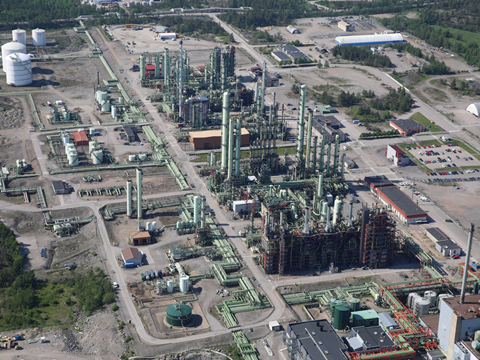
Infinium and Borealis have entered into an agreement to enable the production of low-carbon-footprint polyolefins generated from waste carbon dioxide (CO2) emissions that would otherwise be released into the atmosphere.
The companies say polyolefins are commonly used in manufacturing consumer goods including packaging, appliances, apparel and medical devices. Infinium is reportedly ‘the world’s first’ supplier of commercial volumes of eNaphtha, a ‘sustainable’ drop-in alternative to traditional fossil-based naphtha, aiming to help decarbonize plastics production and reduce harmful CO2 emissions globally.
Infinium says its eNaphtha is manufactured at the company’s Project Pathfinder facility in Corpus Christi, Texas, USA, and commercial eNaphtha volumes are being shipped to Borealis’ Porvoo facility in Finland, which provides polyolefin solutions to its manufacturing customers. The world’s first commercial eNaphtha shipment left the United States in May.
Apparently, plastics made from Infinium eNaphtha can be produced using the same facilities, manufacturing equipment and recycled in the same way as a conventional naphtha-based product. eNaphtha has reportedly received ISCC PLUS certification from the International Sustainability and Carbon Certification (ISCC) body, ensuring the traceability of the feedstock from its point of origin throughout the entire chain of custody.
“Many people aren’t aware that countless plastics products we use every day come from fossil-based components,” said Infinium CEO Robert Schuetzle. “With Infinium eNaphtha, Borealis will create plastics with an ultra-low carbon footprint for customers and end consumers seeking more sustainable, environmentally friendly alternatives.”
Mirjam Mayer, vice president of Circular Economy Solutions at Borealis, added: “Atmospheric carbon […] allows us to serve the needs of our customers while reducing their carbon footprints. Through this collaboration with Infinium, we show that atmospheric carbon, obtained by effectively capturing and storing carbon emissions in products during their lifetime, can constitute a circular building block for the future.”
Borealis revealed a €4.5 million investment in the cracker furnaces at its olefins unit in Porvoo, Finland in April, aiming to increase the share of renewable and recycled raw materials used in its ethylene and polypropylene production. The renewable and chemically recycled base chemicals produced at Borealis’ Porvoo site have reportedly been awarded the ISCC PLUS certification.
In June, Borealis announced it was installing a semi-commercial demonstration compounding line for recyclate-based polyolefins in Beringen, intended to convert post-consumer waste into rigid polypropylene and polyethylene. Aiming to help customers incorporate recycled plastics into their product lines, the line is expected to be fully operational in the first half of 2025.
If you liked this story, you might also enjoy:
How are the top brands progressing on packaging sustainability?
Sustainable Innovation Report 2024: Current trends and future priorities
Reuse vs. single use – which is better for the environment?
The ultimate guide to global plastic sustainability regulation














No comments yet